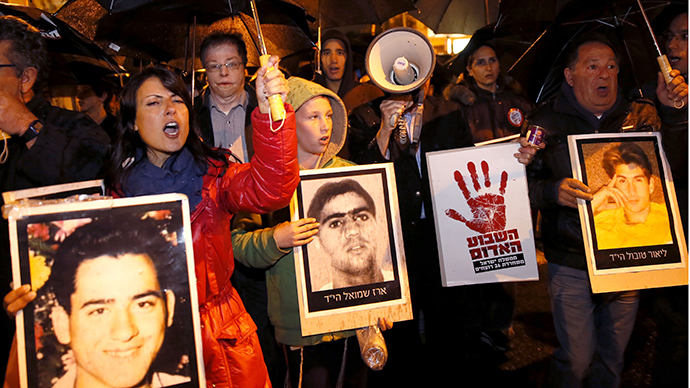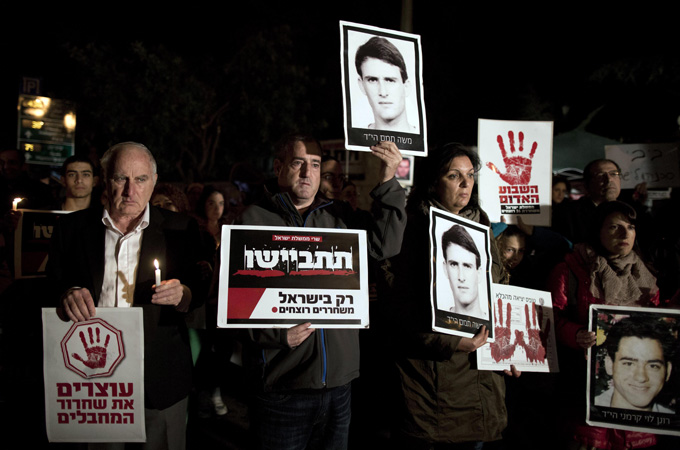
Israeli bereaved families march through Jerusalem in protest as Israel prepares to free 26 Palestinians jailed before the signing of the 1993 Oslo Accords on December 30, 2013. (AFP Photo/Gali Tibbon)
Israel has freed 26 Palestinian prisoners convicted in deadly attacks against Israelis after a court rejected an appeal by the victims’ families to halt the move. The prisoner release is the third of four planned as part of US-brokered peace efforts.
Most of the 26 inmates set free Tuesday were convicted of killing Israelis and spent between 19 and 28 years in prison. Almost all were jailed before the Oslo Accords, when the first Israeli-Palestinian interim peace deals were signed in 1993. Three of the prisoners were released to the Gaza Strip, 18 to West Bank and 5 to East Jerusalem.
Ahead of the release, several hundred protesters marched late Monday from Prime Minister Benjamin Netanyahu’s Residence in Jerusalem to the home of one of the terrorists, shouting: “Don’t release the murderers!” and “Death to terrorists!”
A number of streets were closed off due to the rally, organized by the chairman of the Almagor terror victims association, Meir Indor.
Passions ran high when the protesters passed by the US Consulate to rail against President Barack Obama and US Secretary of State John Kerry, whose efforts helped resume peace negotiations in July after a three-year break. One man shouted: “Release terrorists in your own country!” while another added: “You have no right to put our people in danger!”
“At the end of the day, the release of these terrorists is a result of the pressure being imposed on Israel by Obama and Kerry,” one of the protesters, Jonathan Benedek, told The Jerusalem Post. “I don’t believe that any prime minister in his right mind would willingly release these terrorists or believe this is a good thing for Israel strategically.”
Despite mass protests, the release of the prisoners was carried out overnight. Their relatives and supporters gave a heroes’ welcome to the men, celebrating with fireworks.
51-year-old Ahmed Shihadeh, from the Qalandia refugee camp in the West Bank, spent nearly three decades in prison after being convicted of the murder of an alleged collaborator with Israel. For the past two years his mother was unable to visit her son in prison because she could no longer walk.
“I’ve visited him in 14 jails. I would leave my kids screaming and go for a visit,” Haseba Shihadeh told AP.
In total, Israel said 104 prisoners would be set free; 52 have been released prior to those 26 released on Tuesday. The fourth round of releases is due to take place in April.
Palestinian President Mahmoud Abbas pledged not to sign a final peace deal with Israel “before all the prisoners are released.”

Rami Barbakh, a released Palestinian prisoner, (C), is reunited with his mother upon arriving at his home in Khan Younis in the southern Gaza Strip on December 31, 2013. (AFP Photo/Said Khatib)
Meanwhile, Israeli Prime Minister Benjamin Netanyahu has come under fire for his decision to balance out the series of controversial releases with plans to build 1,400 new homes in both the West Bank and East Jerusalem.
While supporters of peace talks say the construction will ruin the goodwill gesture created by the prisoner release, many others slammed Prime Minister Netanyahu for connecting the Jewish settlement issue with the release of those they call “murderers.”
Settler leader Dani Dayan said the timing of a new settlement announcement was wrong. “The linkage between the release of convicted terrorists and the construction in Jerusalem and in Judea and Samaria puts an unnecessary stain on the construction.”
Palestinians see the settlements (which most countries regard as illegal), as an obstacle to a viable state they seek in the West Bank and the Gaza Strip. Israel took possession of those territories in the 1967 war and pulled out of the Gaza Strip.
The Palestinians have appealed to the US to block the expected announcement, saying such construction threatens peace efforts. Both the US and the EU have spoken against settlement plans. Netanyahu pledged he would not back down, however. “In these negotiations we are faced with our essential interests, including guaranteeing the settlements in the land of Israel,” he said.
“Leadership is judged by the ability to implement decisions, difficult as they may be,” Netanyahu told members of his Likud Party on Monday. “We were not elected to make easy decisions.”
In another move that could also hamper peace efforts, an Israeli Cabinet ministers committee on Sunday backed a bill that would annex a section of the West Bank near the Jordanian border to Israel. Netanyahu insists that Israel must maintain a presence in the area for security reasons. Abbas rejected the move. “This is Palestinian land and we will not let them do it,” he said in Ramallah.
The chances are small that the bill will receive parliamentary approval, however. Israel’s chief negotiator, centrist Justice Minister Tzipi Livni, said she would use all her political influence to block the legislation from being voted on in Parliament.

























